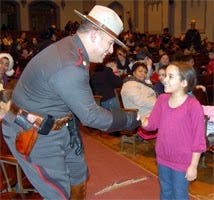DHS run police departments are using community outreach programs to spy on citizens

Image source: http://www.risp.ri.gov/outreach/
A grant proposal from the St. Paul Police Department to the Justice Department, which the Brennan Center obtained through a Freedom of Information Act request to the FBI, lays out a plan in which Somali-speaking advocates would hold outreach meetings with community groups and direct people toward the Police Athletic League and programs at the YWCA. The proposal says that “the team will also identify radicalized individuals, gang members, and violent offenders who refuse to cooperate with our efforts.”
“It’s startling how explicit it was – ‘You don’t want to join the Police Athletic League? You sound like you might join al-Shabab!’” said Michael Price, an attorney with the Brennan Center.
In an internal memo obtained by the Brennan Center, however, the teams were called a “paradigm shift,” allowing “FBI outreach to support operational programs.”
The ACLU has documented numerous cases in recent years in San Francisco and San Jose where federal agents visited mosques and attended Ramadan dinners in the name of outreach, all the while keeping records on the participants.
The ACLU also reported as far back as 2011 the FBI has been using community outreach programs to spy on citizens. And in 2013 the ACLU proved the FBI's community outreach programs are a Trojan horse. Click here to read more.
The Islamic State may be the new face of religious extremism, but for a number of years, law enforcement in St. Paul and Minneapolis have had to contend with the appeal of al-Shabab to members of the country’s largest Somali population—more than 20 young men have reportedly left Minnesota to fight with the group since 2007.
Dennis Jensen, St. Paul’s former assistant police chief, had spent years studying relations between police and the city’s Somali community, which is largely composed of recent immigrants from a war zone who have little reason to trust the authorities. But the al-Shabab threat galvanized the Department to see their work as a frontline for counterterrorism. Jensen told the Center for Homeland Defense and Security in 2009 that extremist recruitment added “a greater sense of urgency about what we are doing,” he said. “We’re up front about what our intentions are. It’s not a secret we’re interested in radicalized individuals.”
Jensen helped design a new program for St. Paul–a two-year initiative called the African Immigrant Muslim Coordinated Outreach Program, which was funded in 2009 with a $670,000 grant from the Justice Department.
The outreach push would help police identify gang members or extremists, using “criteria that will stand up to public and legal scrutiny,” according to the proposal submitted to the Justice Department.
“The effort of identifying the targets will increase law enforcement’s ability to maintain up-to-date intelligence on these offenders, alert team members to persons who are deserving of additional investigative efforts and will serve as an enhanced intelligence system,” the proposal reads. The Center for Homeland Defense and Security, in the 2009 interview with Jensen, characterized it as “developing databases to track at-risk youth who may warrant follow-up contact and investigation by law enforcement.”
Asad Zaman, executive director of the Muslim American Society of Minnesota, said that his organization got funding through the program to hire a police liaison. They held meetings once or twice a month for two years, usually involving 20 or so community members and a few local cops. “The officers talked about drug enforcement and gangs and recruitment and domestic violence. Everyone loved it when they brought their bomb-sniffing robot once,” he recalled.
He said he was not told about an intelligence component, though he had been asked to keep track of attendees at outreach meetings. “Several times [the police department] asked me whether that was possible to turn over the list of people at the programs, and I said, ‘It ain’t gonna happen,’” Zaman said.
Steve Linders, a St. Paul Police spokesman, said that “the intelligence aspect never came to fruition. The program evolved away from that.” He said that they would sometimes pass information that community members brought to their attention to the FBI, but that was the extent of the bureau’s involvement.
Wink, wink... it's because they've all been entered into a Fusion Center database.
Click here to read more and here to read how the Boston Police are spying on activists.
The FBI would not say if the “Specialized Community Outreach Teams” (which have ended) would be allowed under the new guidance, though in a statement, the FBI said the guidance “does not restrict coordination with operational divisions to obtain a better understanding of the various violations (i.e. terrorism, drugs, human trafficking, white collar crime, etc.) which may be impacting communities.”
Lori Saroya, until recently executive director of the Council on American-Islamic Relations Minnesota, said that people weren’t always aware of their rights when faced with outreach visits. “We had cases of people inviting FBI agents in for tea or to have dinner, not knowing they didn’t have to let them in,” she said.
“If the guidance would allow this program to continue, then it just confirms that it’s full of loopholes,” said Price, of the Brennan Center.
https://firstlook.org/theintercept/2015/01/21/spies-among-us-community-outreach-programs-muslims-blur-lines-outreach-intelligence/


